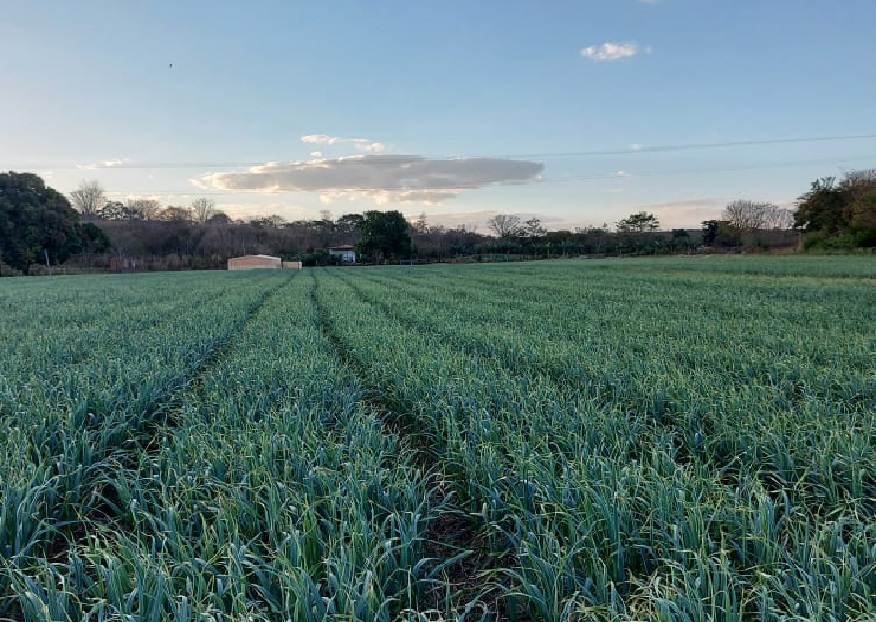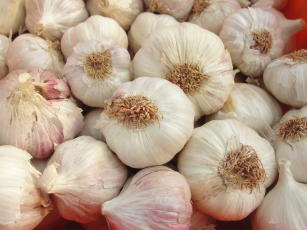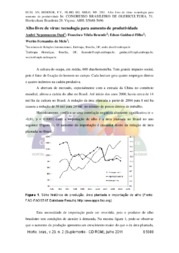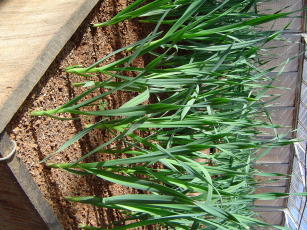Embrapa Cerrados
 Busca de Notícias
Busca de Notícias
Technology that changed garlic production in Brazil turns 30
2022 has a special flavour for Embrapa Vegetables’ Garlic Breeding Program. This year, the technology that has been changing the panorama of garlic production in Brazil celebrates 30 years of development. The positive impacts represented by productivity gains, which can reach over 50%, are due to Virus-Free Garlic Seed technology, based on a cleaning process to eliminate viruses and other pathogens.
For the researcher Francisco Vilela, who coordinates the Embrapa Vegetables’ program, the verified increase has a strong link to the expanded use of the technology, allied with advances in cultivation systems. “The rise in mechanization, modernization of irrigation systems, improvement in nutrition, and phytosanitary management had brought improvements to production, but the highest impact stems from the introduction of virus-free garlic seeds in the farmlands”, the researcher points out.
After 32 years of working with garlic cultivation, Vilela explains that viroses have always been the main diseases in cultivation. According to him, viruses are pathogens of difficult control, once chemical products such as those used to control pests and garlic diseases do not affect them. Hence the importance of the technology of obtaining the virus-free garlic seed to reinforce the production chain's important role as an agent that generates jobs and income in the country.
Impacts
The garlic grower José Borges (nicknamed Valdez), in the Bahian town of Cristópolis around 2002/2003, was one of the first to get to know the new technology “that changed his life”. According to him, it is not an exaggeration to say that there are two scenarios: before and after the introduction of virus-free garlic in his property: “It had a high impact. We worked with the virus infected garlic, and the productivity did not reach more than 3.5 t/ha. There was no knowledge that it could be different.” He reports that in the year following the adoption of the VFG technology from Embrapa, the production reached between 9 and 10 tons per hectare, and today it reaches 15 to 16 tons per hectare.
The outcome of this increase in production combined with the quality of the virus-free garlic reflected in the improvement of the financial conditions of the producer. “Thanks to the profitability that was beyond expectations, I can affirm that today I can provide to my family a quality of life that I could not dream of not long ago”. “I adopted the technology that made the difference in our region, where family farming reigns. After my successful experience, many producers also bet on the virus-free garlic seed and today they multiply the seeds”, Valdez explains, who considers being privileged for believing in the Embrapa technology, presented by the researcher Francisco Vilela, to whom he owes “all the achievements obtained since then”.
Anapa
According to the survey by the National Association of Garlic Producers (Anapa), around 18,000 hectares of Brazilian croplands are destined for garlic cultivation. The entity estimates that the cultivation generates around 300,000 jobs in the country, a number that has been increasing 15% by year, thanks to modern cultivation practices, notably the use of the Virus-Free Garlic Seed technology. To Rafael Corsino, Anapa’s President, the cultivation of virus-free garlic seed has directly influenced productivity: “We moved away from a plateau of 12 to 14 tonnes/hectare on to something around 20 to 25 tonnes/hectares with the technology”.
Process
The virus-free garlic technology eliminates the viruses in the garlic bulbils through in-laboratory micropropagation techniques. Then the plants are multiplied in vitro and tested to ensure virus elimination. The multiplied plants are cultivated in special insect-proof screens against pests like mites and aphids, which transmit viruses and other diseases.
The process ensures that the garlic plants stay healthy, and so do the bulbils used as seeds. Besides the productivity, another impact related to the adoption of VFG relates to the increase in the commercial value of the vegetable due to its quality and bigger bulbs, which results in higher acceptance and consequently higher remuneration.
Anelise Macedo (MTB 2.749/DF)
Embrapa Vegetables
Press inquiries
imprensa.hortalicas@embrapa.br
Phone number: +55 61 3385-9109
Translation: Leonardo Martins, supervised by Mariana Medeiros (13044/DF)
Superintency of Communications
Further information on the topic
Citizen Attention Service (SAC)
www.embrapa.br/contact-us/sac/




